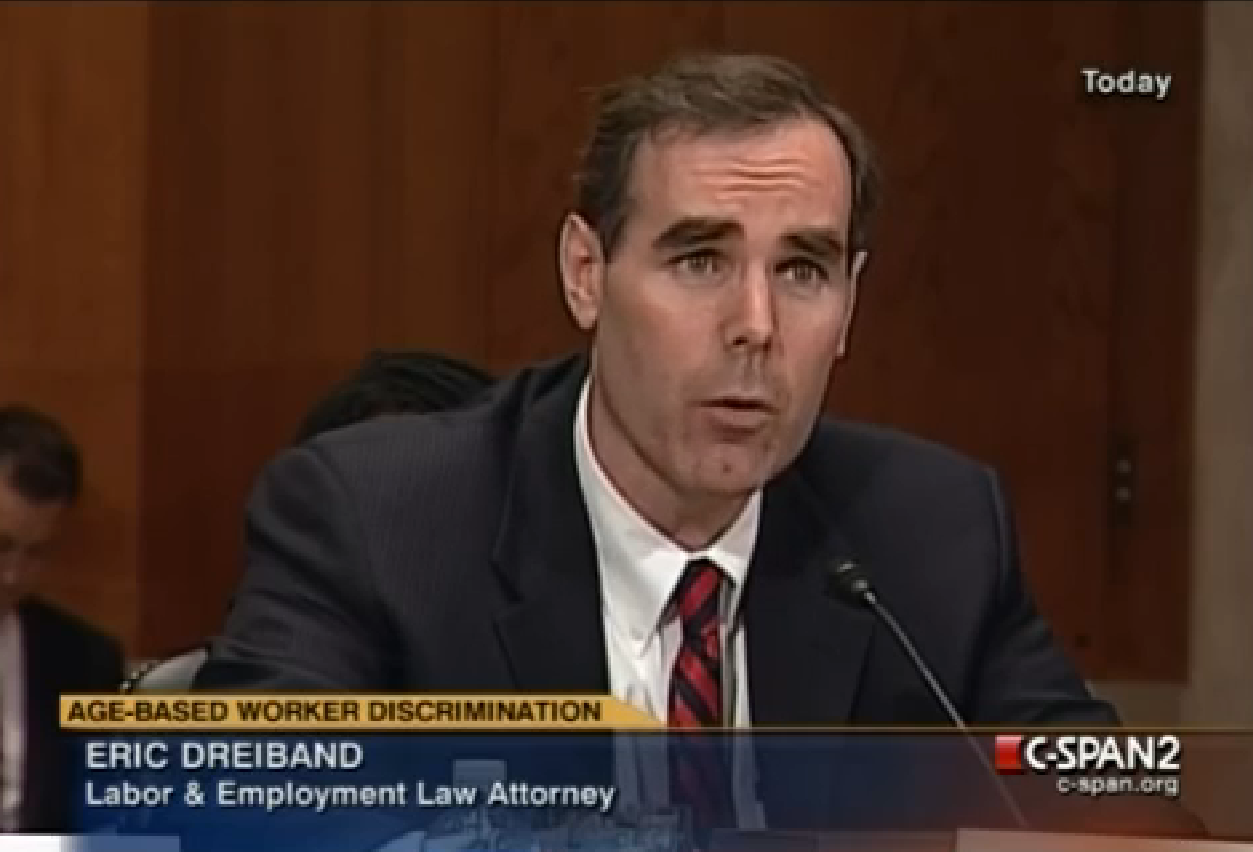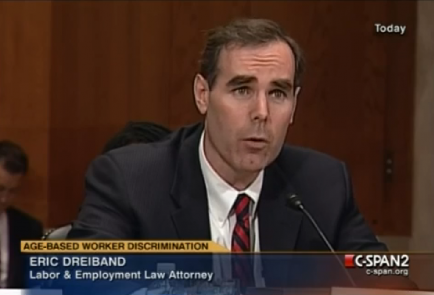Abortion rights, women of color, and LGBTQI+ people are under attack. Pledge to join us in fighting for gender justice.
Trump’s Civil Rights Nominee Confirms He’s Bad For Civil Rights

 On Wednesday, the Senate Judiciary Committee held a confirmation hearing for Eric Dreiband, Trump’s nominee to lead the Department of Justice Civil Rights Division, one of the most important government agencies tasked with protecting civil and constitutional rights. In an unusual move, Dreiband’s hearing was combined with that of four judicial nominees. The result was that senators had little time to question any of the nominees and specifically had limited opportunity to probe Dreiband’s record and views on critical civil rights laws and enforcement, which are at odds with the mission of the Civil Rights Division. Perhaps because of this manipulation of schedule in order to minimize questioning, fairly few senators attended. But what we did hear from Dreiband, particularly with regard to gender discrimination, only reinforced our view that he should not be confirmed.
On Wednesday, the Senate Judiciary Committee held a confirmation hearing for Eric Dreiband, Trump’s nominee to lead the Department of Justice Civil Rights Division, one of the most important government agencies tasked with protecting civil and constitutional rights. In an unusual move, Dreiband’s hearing was combined with that of four judicial nominees. The result was that senators had little time to question any of the nominees and specifically had limited opportunity to probe Dreiband’s record and views on critical civil rights laws and enforcement, which are at odds with the mission of the Civil Rights Division. Perhaps because of this manipulation of schedule in order to minimize questioning, fairly few senators attended. But what we did hear from Dreiband, particularly with regard to gender discrimination, only reinforced our view that he should not be confirmed.
Narrowing Avenues for Challenging Pay Discrimination
In 2008, Dreiband testified in his personal capacity against legislation designed to help women challenge pay discrimination. That legislation was later enacted in 2009 with bipartisan support as the Lilly Ledbetter Fair Pay Act. The Act restored protections against pay discrimination stripped away by a narrow majority of the Supreme Court in Ledbetter v. Goodyear Tire & Rubber Co., and made it clear that each discriminatory paycheck – and not just an employer’s original decision to engage in pay discrimination – resets the period of time during which an employee may file a claim of pay discrimination on the basis of sex, race, national origin, age, religion and disability. Dreiband testified that he “did not believe that the bill would advance the public interest.”
When senators questioned Dreiband on Wednesday about his Ledbetter Act testimony, he claimed that he was not opposed to the Act, and that in fact he had advocated for an alternative that provided broader protections. Dreiband said he had suggested Congress should codify the doctrines of equitable tolling and equitable estoppel, which he claimed would help all victims of discrimination, not just pay discrimination.
This claim is disingenuous at best. Equitable tolling is a principle providing that a plaintiff’s claim will not be time-barred where the plaintiff, despite her due diligence, couldn’t or didn’t discover discrimination until after the expiration of the statute of limitations. Equitable estoppel also permits extension of the time to file a claim where, for example, an employer’s misconduct conceals discrimination or prevents an employee from filing a timely claim. These doctrines are already available to judges considering Title VII claims, including pay discrimination. Dreiband’s “solution” — codifying equitable tolling and equitable estoppel — would have created significantly narrower and more burdensome ways for women to bring pay discrimination claims than those ensured by the Ledbetter Act. For instance, equitable tolling would require employees to prove that they were not to blame for failing to discover discrimination earlier, and would start the clock running from the first moment they did find out. Under the Ledbetter Act, by contrast, an employee can bring a timely claim of pay discrimination as long as she continues to receive paychecks affected by the discrimination. In other words, the Ledbetter Act appropriately recognizes that pay discrimination is an ongoing violation that continues as long as an individual receives depressed pay on the basis of her sex.
Under questioning by Senator Blumenthal, Dreiband also conceded that his 2008 prediction that the Ledbetter Act would create “unanticipated and potentially ruinous liability” for employers had not come to pass, and that “we have not seen the litigation that I would have expected.”
Refusing to Recognize Civil Rights Protections for LGBTQ Individuals
At his confirmation hearing, Dreiband declined to affirm that Title VII and Title IX protect LGBTQ people from discrimination. Indeed, the Department of Justice recently filed an amicus brief in a case pending before the Second Circuit Court of Appeals, arguing that Title VII’s prohibition against sex discrimination does not include protection from sexual orientation discrimination — a position in opposition to that of another federal agency responsible for civil rights enforcement, the Equal Employment Opportunity Commission, in the very same case. At the hearing Dreiband said it would be “inappropriate” for him to comment on whether Title VII prohibits sexual orientation discrimination, because the issue was the subject of pending litigation. This answer is puzzling, given that Dreiband is not being considered for a judicial role, where he arguably would be bound to avoid prejudging matters that might become before him in order to preserve his impartiality, but is instead being considered for the role of a civil rights advocate, who will take litigating positions based on his interpretations of the reach of civil rights law.
In any case, his record gives little reassurance as to his beliefs on this point. Indeed, Dreiband recently defended the University of North Carolina when the state was sued by the Obama Department of Justice after it passed a law, HB2, limiting transgender individuals’ access to bathrooms. When pressed at the hearing to explain his defense of the university, Dreiband said his role was limited to a “procedural defense,” arguing that the university had no role in enacting the state law or monitoring bathroom use. He declined to answer when asked whether he believed Title IX protects transgender students. Earlier this year, the Trump Administration rescinded a Department of Education guidance clarifying that Title IX provided this protection.
Despite Dreiband’s claim that as leader of the Civil Rights Division he would “zealously enforce” the law, his record of efforts to narrow the scope of anti-discrimination laws, and repeatedly expressed hostility to broad civil rights enforcement authority and important enforcement tools, says otherwise. Accordingly, we strongly urge the Senate to reject his nomination.





